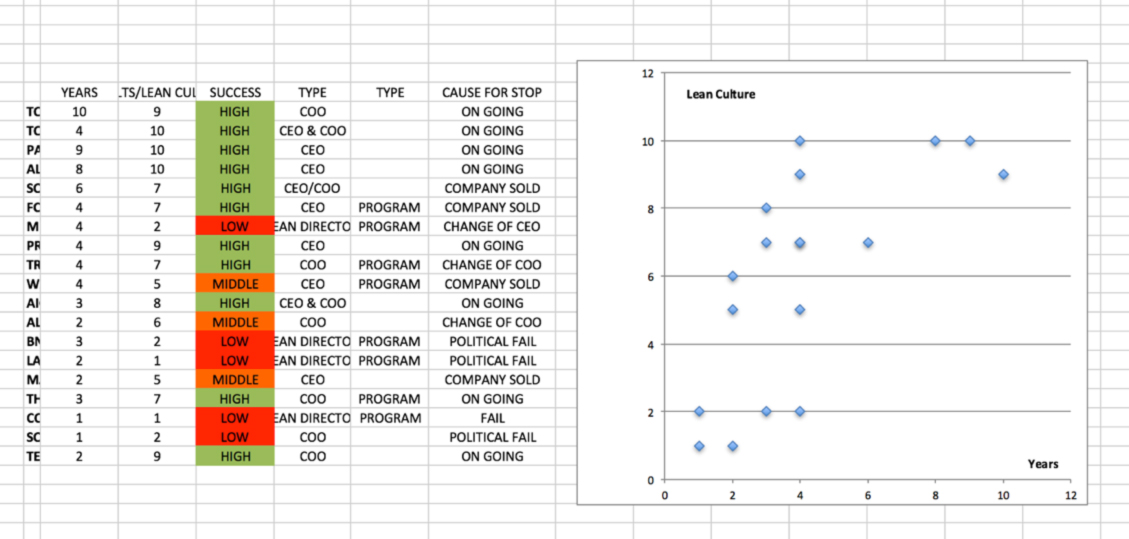Dear Gemba Coach,
What are your thoughts about ensuring that a lean transformation persists past a leader’s tenure at an organization?
This is a question I often get, related to another one: why are you lean guys so fixated on Toyota – isn’t there any other Toyotas? (i.e. does lean really work?). Here’s the fix: (1) lean really works, (2) it’s amazing – you can make the most bureaucratic organization actually work – but it is not sustainable past its leader’s tenure. End of story.
It is, however, completely sustainable if the next leader is also a lean thinker – but how likely is that?
In my experience, CEO-led lean, when the CEO works with an experienced sensei, always works. The failures I’ve seen are mostly in the first couple of years when the CEO chooses not to continue because of the internal political battles lean causes. But once the key players are on board, I’ve not seen one case of lean not delivering superior results from two broad changes, one cognitive and one non-cognitive:

- Cognitive change: the TPS “house” is used to see the business differently, and tackle previously unseen competitive problems, and systematic PDCA is used to learn to solve problems, from the workplace to the boardroom.
- Non-cognitive change: executives go to the gemba to discover with their people what working better means in the present context, rather than to make them work more efficiently.
Charting Success and Failure
I keep track of the lean efforts I’m involved in firsthand with a sense of “lean culture” – more specifically the degree to which the CEO uses lean thinking and practice as his or her core management system. Here’s what it looks like:
What this graph shows is that the main cause for the lean initiative to stop is change of CEO, COO or management altogether when a company is sold.
I have lived through enough of these heartaches, even when the CEO has developed a great team of managers who get lean, the next guy is never pulled from the ranks (not once) but hired out, doesn’t get lean, and puts everything down in about two years. It’s not that he means to – in many cases the company has been purchased because of its lean management system – but simply he doesn’t get it, takes the wrong kind of mura-creating, muri-inducing, muda-generating decisions that tick off lean thinkers who leave or get fired and … reversal to the mean.
Lean systems, when used in a Taylorist/bureaucratic way, with the banal pressure on quarterly results, sinks to: a focus on processes rather than customer satisfaction; turf infighting as everyone tries to solve problems from their own angle (and the CEO sometimes sides with one, then the other); discouraging talented people from challenge their bosses; and remaining too timid to explore new ways of solving current problems. Lean becomes nothing more than just another system, easily devolving into “fake lean,” if the leadership doesn’t get it – no matter how much lip service they give.
As a spectator, the most astounding part is watching how the decline in results (performance also reverts to the mean) is explained by a long list of classic excuses, and shareholders or corporate never (again, not once), react.
Vanishing Sensei
Why only Toyota? It’s not that lean doesn’t work – it does. Toyota is the only company I know where every retiring president remains part of the board. Toyota certainly never had only lean thinking presidents and CEOs, but, by what experts tell me, at least one over two, which is more than enough to keep the kaizen spirit alive in the company, and a critical mass of younger lean thinkers. And yet, still Toyota struggles also.
The first generation of lean senseis were true originals – difficult people who had no hesitation to stand out, speak up, and push hard, whilst being savvy enough to navigate the politics of the company. They were also consummate car guys who understood the automotive market and automotive manufacturing inside out and outside in. The first and second generation of sensei is now fading away and although Toyota, by all accounts, have many managers who understand the cognitive dimensions of lean, it is apparently struggling with the non-cognitive lean attitude just as everyone else is (Akio Toyoda, the current president and CEO, is working on this – time will tell whether he’ll succeed).
I realize that irony is the driving force of the universe, and wishful thinking the fuel of most human endeavors. I understand the search for a “sustainable lean” model. But please consider that seeking a mechanical model that works beyond the current leader is more a reflection of our own bureaucratic/Taylorist thinking than of lean. There is no such thing as a lean company. There are companies led by lean leaders. Until we figure out how to pass the baton from one lean leader to the next, this question will remain unanswered. Lean is not in the management system (you need the management system to practice lean, but it’s the scaffolding, not the business). Lean is in the depth of understanding TPS and the warmth with which we work with value-adding employees.




